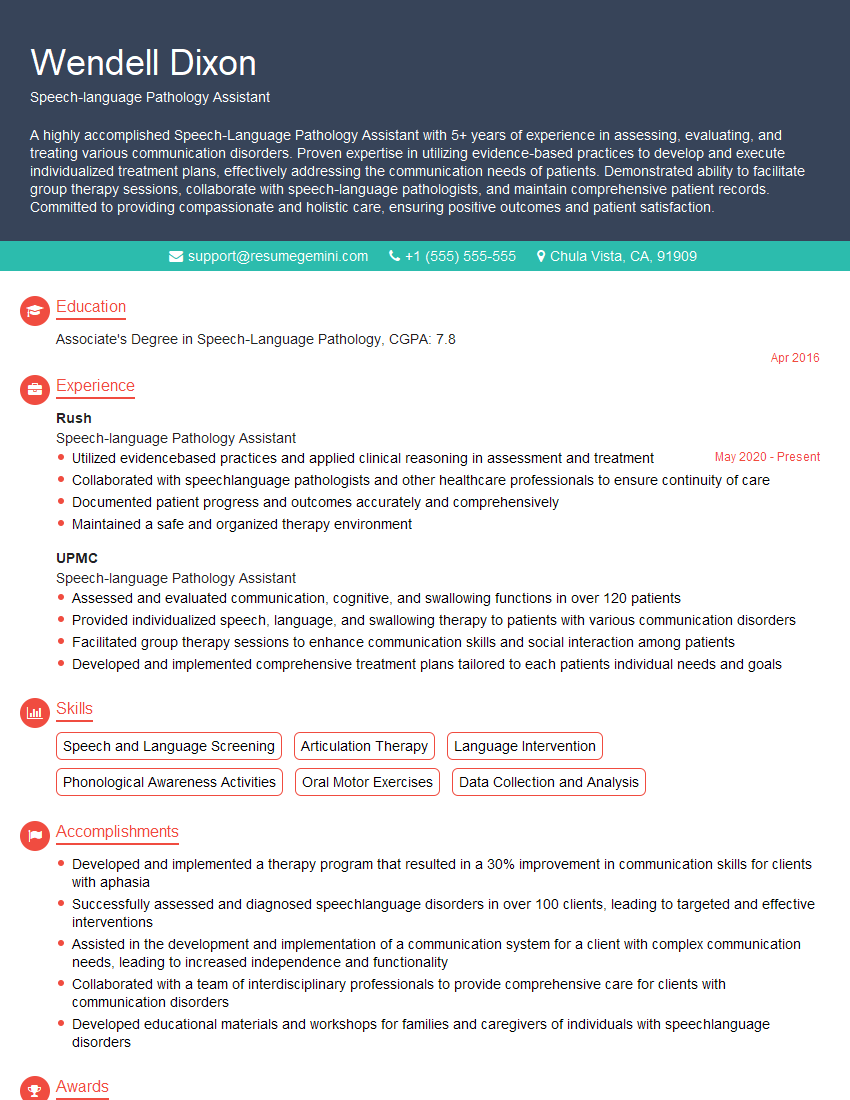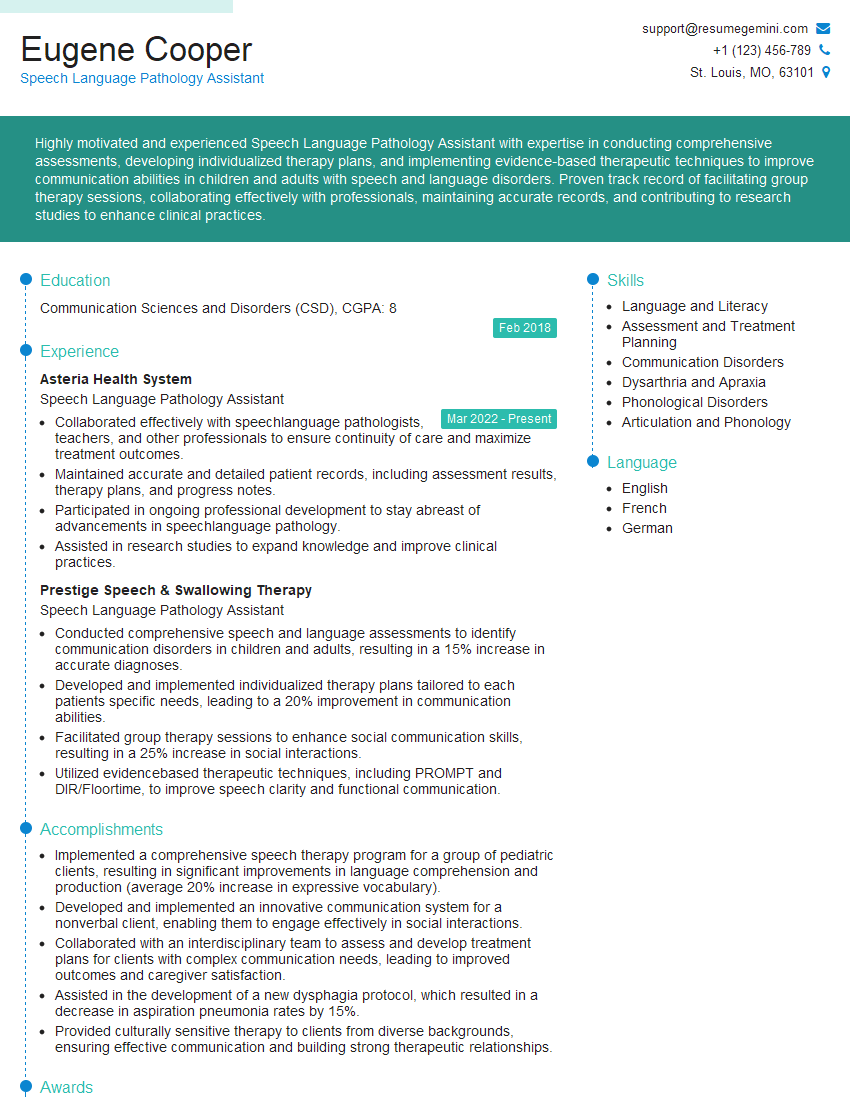Are you gearing up for a career shift or aiming to ace your next interview? Look no further! We’ve curated a comprehensive guide to help you crack the interview for the coveted Speech-language Pathology Assistant position. From understanding the key responsibilities to mastering the most commonly asked questions, this blog has you covered. So, buckle up and let’s embark on this journey together.
Acing the interview is crucial, but landing one requires a compelling resume that gets you noticed. Crafting a professional document that highlights your skills and experience is the first step toward interview success. ResumeGemini can help you build a standout resume that gets you called in for that dream job.
Essential Interview Questions For Speech-language Pathology Assistant
1. Describe the key components of a comprehensive speech and language evaluation.
A comprehensive speech and language evaluation typically includes the following components:
- Case history: This involves gathering information about the client’s developmental history, medical history, and communication needs.
- Assessment of receptive language: This measures the client’s ability to understand spoken language.
- Assessment of expressive language: This measures the client’s ability to produce spoken language.
- Assessment of articulation: This measures the client’s ability to produce speech sounds correctly.
- Assessment of fluency: This measures the client’s ability to produce speech smoothly and without interruptions.
- Assessment of voice: This measures the client’s ability to produce speech with the appropriate pitch, volume, and quality.
- Assessment of cognition: This measures the client’s cognitive skills, such as attention, memory, and problem-solving.
- Assessment of social communication: This measures the client’s ability to interact with others in a socially appropriate manner.
2. What are some common causes of speech and language disorders?
Some common causes of speech and language disorders include:
Genetic factors
- Down syndrome
- Fragile X syndrome
- Williams syndrome
Neurological factors
- Cerebral palsy
- Autism spectrum disorder
- Traumatic brain injury
Environmental factors
- Exposure to lead
- Prenatal alcohol exposure
- Neglect or abuse
3. What are some of the most effective treatments for speech and language disorders?
Some of the most effective treatments for speech and language disorders include:
- Speech therapy: This involves working with a speech-language pathologist to improve a client’s speech and language skills.
- Language therapy: This involves working with a speech-language pathologist to improve a client’s language comprehension and expression skills.
- Articulation therapy: This involves working with a speech-language pathologist to improve a client’s ability to produce speech sounds correctly.
- Fluency therapy: This involves working with a speech-language pathologist to improve a client’s ability to produce speech smoothly and without interruptions.
- Voice therapy: This involves working with a speech-language pathologist to improve a client’s ability to produce speech with the appropriate pitch, volume, and quality.
- Cognitive therapy: This involves working with a speech-language pathologist or other therapist to improve a client’s cognitive skills, such as attention, memory, and problem-solving.
- Social communication therapy: This involves working with a speech-language pathologist or other therapist to improve a client’s ability to interact with others in a socially appropriate manner.
4. What is the role of the speech-language pathology assistant in the assessment and treatment of speech and language disorders?
The speech-language pathology assistant plays a vital role in the assessment and treatment of speech and language disorders. Under the supervision of a speech-language pathologist, the assistant may:
- Administer and score speech and language tests
- Collect case history information
- Implement treatment plans
- Monitor client progress
- Provide support to clients and their families
- Maintain treatment records
- Assist with research projects
5. What are the ethical principles that guide the practice of speech-language pathology?
The ethical principles that guide the practice of speech-language pathology include:
- Autonomy: Respecting the client’s right to make decisions about their own care.
- Beneficence: Acting in the best interests of the client.
- Non-maleficence: Avoiding harm to the client.
- Justice: Treating all clients fairly and equitably.
- Confidentiality: Maintaining the privacy of client information.
- Competence: Providing services within the scope of one’s training and experience.
6. What are some of the challenges that speech-language pathologists and assistants face in their work?
Some of the challenges that speech-language pathologists and assistants face in their work include:
- Working with clients who have complex needs
- Managing a heavy caseload
- Keeping up with the latest research and best practices
- Working with clients from diverse backgrounds
- Dealing with difficult parents or caregivers
- Burnout
7. What are your strengths as a speech-language pathology assistant?
Some of my strengths as a speech-language pathology assistant include:
- I am passionate about helping others.
- I am a quick learner and I am eager to take on new challenges.
- I am a team player and I am always willing to help out my colleagues.
- I am organized and I am able to manage my time effectively.
- I am able to build rapport with clients and their families.
- I am committed to providing high-quality care to my clients.
8. What are your career goals?
My short-term career goal is to become a certified speech-language pathology assistant. My long-term career goal is to work in a school setting and help children with speech and language disorders reach their full potential.
9. What are your salary expectations?
My salary expectations are in line with the market rate for speech-language pathology assistants in my area. I am also willing to negotiate based on the benefits package and other factors.
10. Do you have any questions for me?
I am very interested in this position and I would like to learn more about the following:
- The specific responsibilities of the position
- The opportunities for professional development
- The work environment and culture
Interviewers often ask about specific skills and experiences. With ResumeGemini‘s customizable templates, you can tailor your resume to showcase the skills most relevant to the position, making a powerful first impression. Also check out Resume Template specially tailored for Speech-language Pathology Assistant.
Career Expert Tips:
- Ace those interviews! Prepare effectively by reviewing the Top 50 Most Common Interview Questions on ResumeGemini.
- Navigate your job search with confidence! Explore a wide range of Career Tips on ResumeGemini. Learn about common challenges and recommendations to overcome them.
- Craft the perfect resume! Master the Art of Resume Writing with ResumeGemini’s guide. Showcase your unique qualifications and achievements effectively.
- Great Savings With New Year Deals and Discounts! In 2025, boost your job search and build your dream resume with ResumeGemini’s ATS optimized templates.
Researching the company and tailoring your answers is essential. Once you have a clear understanding of the Speech-language Pathology Assistant‘s requirements, you can use ResumeGemini to adjust your resume to perfectly match the job description.
Key Job Responsibilities
As a Speech-language Pathology Assistant, you’ll play a pivotal role in assisting speech-language pathologists in providing essential services to individuals with communication disorders.
1. Supporting Evaluations and Therapy Sessions
You’ll assist in evaluations by administering screening tests and gathering case history information, enabling the speech-language pathologist to make accurate diagnoses.
- Prepare and set up materials for therapy sessions, ensuring they align with the treatment plans.
- Supervise and aid clients during therapy activities, facilitating their progress and fostering communication skills.
2. Maintaining Patient Records
You’ll maintain accurate and detailed patient records, ensuring all information is up-to-date and accessible for review by the speech-language pathologist.
- Document client progress, including observations, goals met, and any changes in condition.
- Prepare reports and summaries for the speech-language pathologist and other healthcare professionals, providing insights into client progress and needs.
3. Equipment Management
You’ll be responsible for maintaining and troubleshooting equipment utilized in speech therapy, ensuring it operates efficiently and safely.
- Inspect and clean equipment regularly, identifying potential issues and addressing them promptly.
- Maintain inventory of supplies and equipment, ensuring availability for therapy sessions.
4. Communication and Collaboration
Effective communication and collaboration are crucial in this role.
- Communicate regularly with the speech-language pathologist to provide updates on client progress and discuss treatment plans.
- Collaborate with other healthcare professionals, such as occupational therapists and physical therapists, to ensure a cohesive approach to client care.
Interview Tips
Preparing thoroughly for your interview will increase your chances of making a positive impression and landing the job.
1. Research the Organization and Position
Familiarize yourself with the organization’s mission, values, and services. Understand the specific responsibilities of the Speech-language Pathology Assistant role and how it aligns with your skills and experience.
- Visit the organization’s website and social media pages to gather information.
- Review online job descriptions and articles related to the role to gain insights into industry trends.
2. Practice Your Answers
Prepare thoughtful responses to common interview questions. Anticipate questions related to your experience, skills, and motivation for pursuing this role.
- Use the STAR method (Situation, Task, Action, Result) to structure your answers and provide concrete examples of your accomplishments.
- Practice your answers aloud to improve your delivery and ensure clarity.
3. Dress Professionally and Arrive on Time
First impressions matter. Dress appropriately for the interview, ensuring your attire is clean, pressed, and reflects the professional nature of the role.
- Arrive on time for your interview, demonstrating respect for the interviewer’s schedule.
- Maintain eye contact, speak clearly, and project confidence throughout the interview.
4. Ask Thoughtful Questions
Asking thoughtful questions at the end of the interview demonstrates your engagement and interest in the role and organization.
- Inquire about the organization’s goals and priorities, as well as the specific challenges and opportunities within the Speech-language Pathology Assistant role.
- Ask about opportunities for professional development and growth within the organization.
5. Send a Thank-You Note
After the interview, send a brief thank-you note to the interviewer, reiterating your interest in the position and expressing your appreciation for their time.
- Highlight a specific aspect of the interview or your qualifications that you believe would make you a valuable asset to the team.
- Reiterate your enthusiasm for the position and organization.
Next Step:
Armed with this knowledge, you’re now well-equipped to tackle the Speech-language Pathology Assistant interview with confidence. Remember, preparation is key. So, start crafting your resume, highlighting your relevant skills and experiences. Don’t be afraid to tailor your application to each specific job posting. With the right approach and a bit of practice, you’ll be well on your way to landing your dream job. Build your resume now from scratch or optimize your existing resume with ResumeGemini. Wish you luck in your career journey!

